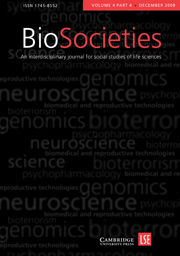Article contents
The Commodification of Emergence: Systems Biology, Synthetic Biology and Intellectual Property
Published online by Cambridge University Press: 01 December 2008
Abstract
In this article I address the interactions between biological knowledge and ideas about the kinds of entity that are suited to appropriation. I start by arguing that commodification and reductionism are closely linked, and that patenting suits entities that are discrete and isolable, such as those that are the focus of molecular biology. I then turn to the new field of systems biology, which recognizes that traditional reductionist approaches to biology are no longer adequate and attempts to provide a more integrative understanding of biological systems. In doing this, systems biology has to deal with emergent phenomena. But patenting does not suit the dynamic and interactive complexity that is the object of study in systems biology. If systems biology rejects reductionism where does that leave commodification? I examine attempts to commodify predictive computational models in systems biology. I then turn to systems biology's sister discipline, synthetic biology, which deals with emergence by reducing the complexity of biological systems. By factoring out messy contingencies, synthetic biology is, in theory, well suited to commodification. Drawing on both these examples I explore how ideas about appropriation, including open source, are influencing the nature and course of research in biology.
Keywords
- Type
- Articles
- Information
- Copyright
- Copyright © London School of Economics and Political Science 2008
References
- 64
- Cited by


